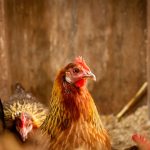Coyotes are prevalent predators that present a substantial risk to backyard chicken flocks. These highly adaptable canines inhabit various regions across North America and are renowned for their intelligence and hunting prowess. As opportunistic predators, coyotes readily target chickens as a food source.
Their ability to identify and exploit vulnerabilities in chicken coops and enclosures makes them a significant threat to poultry. Primarily nocturnal, coyotes are most active during nighttime hours when chickens are particularly vulnerable. Their climbing and digging capabilities enable them to access poorly secured chicken coops and runs.
Understanding coyote behavior and abilities is essential for developing effective protection strategies for backyard flocks. Coyotes demonstrate high intelligence and rapid adaptability to environmental changes. Their persistence in targeting accessible food sources, such as chickens, necessitates ongoing vigilance from poultry keepers.
Recognizing the potential danger coyotes pose to chickens is crucial for implementing proactive protective measures to safeguard flocks from these predators.
Table of Contents
- 1 Fortifying Your Chicken Coop and Run
- 2 Implementing Predator Deterrents
- 3 Utilizing Guard Animals
- 4 Creating a Secure Nighttime Routine
- 5 Removing Attractants and Food Sources
- 6 Seeking Professional Assistance
- 7 FAQs
- 7.1 What are coyotes and why are they a threat to chickens?
- 7.2 What are some effective methods for keeping coyotes away from chickens?
- 7.3 Are there any natural deterrents that can be used to keep coyotes away from chickens?
- 7.4 What should I do if I encounter a coyote near my chicken coop?
- 7.5 Are there any legal methods for dealing with coyotes that are threatening my chickens?
Key Takeaways
- Coyotes pose a significant threat to chickens and other small livestock
- Secure chicken coops and runs with sturdy fencing and hardware cloth to prevent coyote access
- Install motion-activated lights, alarms, and predator-proof latches to deter coyotes
- Consider using guard animals such as dogs or llamas to protect chickens from coyote attacks
- Establish a secure nighttime routine by locking up chickens in a predator-proof coop and removing attractants like food scraps and garbage; seek professional assistance if coyote activity persists
Fortifying Your Chicken Coop and Run
Inspect and Secure the Perimeter
One of the most effective ways to protect your chickens from coyote attacks is to fortify your chicken coop and run. Start by inspecting the perimeter of your coop and run for any gaps or openings that could allow coyotes to gain access. Secure any loose or weak fencing and consider adding an apron of hardware cloth around the perimeter to prevent digging.
Strengthen the Structure
Additionally, consider installing a sturdy roof on your chicken run to prevent coyotes from climbing over the top. Make sure all doors and windows are securely latched and consider adding locks or predator-proof latches for extra security. It is also important to ensure that the coop and run are constructed from durable materials that can withstand attempts by coyotes to break in. Consider using heavy-duty wire mesh, hardware cloth, and solid wood construction to make it as difficult as possible for predators to gain access.
Maintain a Safe Environment
Keep the area around the coop and run free from debris and overgrown vegetation, as these can provide cover for predators. By maintaining a clean and clear area, you can reduce the risk of coyote attacks.
Proactive Measures for a Safe Flock
By taking these proactive measures, you can significantly reduce the risk of coyote attacks on your flock. By fortifying your chicken coop and run, you can provide a safe and secure environment for your chickens to thrive.
Implementing Predator Deterrents

In addition to fortifying your chicken coop and run, implementing predator deterrents can further reduce the risk of coyote attacks on your chickens. One effective deterrent is the use of motion-activated lights and sound devices. These can startle and deter coyotes from approaching your coop and run, especially during the night when they are most active.
Consider placing these deterrents strategically around the perimeter of your property to create a barrier against potential predators. Another effective deterrent is the use of scent-based repellents. Coyotes have a keen sense of smell, and certain scents can be used to deter them from approaching your property.
Consider using natural repellents such as predator urine or citrus-based sprays around the perimeter of your coop and run to create a barrier that coyotes will be reluctant to cross. Additionally, consider installing a predator-proof electric fence around the perimeter of your property. This can provide an effective barrier against coyotes and other predators, as they will receive a mild electric shock if they attempt to breach the fence.
When properly installed and maintained, electric fences can be an effective deterrent against coyote attacks on your chickens.
Utilizing Guard Animals
Another effective strategy for protecting your chickens from coyote attacks is to utilize guard animals. Livestock guardian dogs, such as Great Pyrenees or Anatolian Shepherds, are known for their protective instincts and can be highly effective at deterring coyotes and other predators. These dogs are bred specifically for guarding livestock and have a natural instinct to protect their flock from potential threats.
In addition to livestock guardian dogs, consider using other guard animals such as llamas or donkeys. These animals have a natural aversion to canines and can be effective at deterring coyotes from approaching your property. By utilizing guard animals, you can add an extra layer of protection for your chickens and reduce the risk of coyote attacks.
It is important to note that guard animals require proper training and socialization to be effective at protecting your flock. They should be introduced to your chickens at a young age and trained to recognize them as part of their flock. Additionally, regular supervision and maintenance of guard animals is essential to ensure they remain effective at deterring predators.
Creating a Secure Nighttime Routine
Coyotes are primarily nocturnal hunters, which means they pose the greatest threat to your chickens during the night. Creating a secure nighttime routine for your flock is essential for protecting them from potential coyote attacks. Start by ensuring that all chickens are securely locked inside the coop at night, with no opportunity for predators to gain access.
Consider installing automatic coop doors that close at dusk and open at dawn, reducing the risk of human error in securing the coop at night. Additionally, consider adding extra locks or latches to all coop doors and windows to prevent coyotes from gaining access. Regularly inspect the coop for any signs of wear or damage that could compromise its security.
It is also important to provide a safe roosting area for your chickens inside the coop. Elevated roosts can provide an additional layer of protection against ground-dwelling predators such as coyotes. By creating a secure nighttime routine for your flock, you can significantly reduce the risk of coyote attacks on your chickens.
Removing Attractants and Food Sources

Securing Food Sources
Start by securing all food sources for your chickens, such as feeders and waterers, inside the coop or run where they are not accessible to predators.
Removing Shelter and Attractants
Additionally, consider removing any potential shelter for coyotes on your property, such as brush piles or overgrown vegetation. By clearing these areas, you can reduce the likelihood of coyotes taking up residence near your chickens. It is also important to secure any garbage or compost bins on your property, as these can attract coyotes in search of easy meals.
Creating a Coyote-Resistant Environment
By removing attractants and food sources from your property, you can make it less appealing to coyotes and reduce the likelihood of them targeting your chickens as a food source.
Seeking Professional Assistance
If you are struggling to protect your chickens from coyote attacks, consider seeking professional assistance. Wildlife experts and pest control professionals can provide valuable insight and assistance in developing effective strategies for deterring coyotes from your property. They can also help identify any potential weaknesses in your current predator control measures and provide recommendations for improvement.
Additionally, consider reaching out to local agricultural extension offices or poultry organizations for guidance on protecting your flock from predators such as coyotes. These resources can provide valuable information on best practices for predator control and offer support in implementing effective strategies for protecting your chickens. By seeking professional assistance, you can gain valuable knowledge and support in protecting your flock from coyote attacks, ultimately reducing the risk of losses due to predation.
In conclusion, protecting your chickens from coyote attacks requires a multi-faceted approach that includes fortifying your coop and run, implementing predator deterrents, utilizing guard animals, creating a secure nighttime routine, removing attractants and food sources, and seeking professional assistance when needed. By taking proactive measures to protect your flock from these predators, you can significantly reduce the risk of losses due to predation and provide a safe and secure environment for your chickens to thrive.
If you’re looking for ways to keep coyotes away from your chickens, you may also be interested in learning about the benefits of using an A-frame chicken coop. Check out this article on A-Frame Chicken Coop to find out how this type of coop can provide a safe and secure environment for your chickens while also helping to deter predators like coyotes.
FAQs
What are coyotes and why are they a threat to chickens?
Coyotes are a species of wild canine found in North America. They are a threat to chickens because they are opportunistic predators and will prey on small animals, including chickens, if given the chance.
What are some effective methods for keeping coyotes away from chickens?
Some effective methods for keeping coyotes away from chickens include using secure fencing, installing motion-activated lights or sound devices, using guard animals such as dogs or llamas, and removing attractants such as food scraps or garbage.
Are there any natural deterrents that can be used to keep coyotes away from chickens?
Some natural deterrents that can be used to keep coyotes away from chickens include planting thorny bushes or using strong-smelling plants such as lavender or garlic around the chicken coop.
What should I do if I encounter a coyote near my chicken coop?
If you encounter a coyote near your chicken coop, it is important to make loud noises, wave your arms, and try to appear as large and intimidating as possible to scare the coyote away. Do not run or turn your back on the coyote.
Are there any legal methods for dealing with coyotes that are threatening my chickens?
In some areas, it may be legal to trap or hunt coyotes that are posing a threat to livestock, including chickens. However, it is important to check local regulations and obtain any necessary permits before taking any action against coyotes.
Meet Walter, the feathered-friend fanatic of Florida! Nestled in the sunshine state, Walter struts through life with his feathered companions, clucking his way to happiness. With a coop that’s fancier than a five-star hotel, he’s the Don Juan of the chicken world. When he’s not teaching his hens to do the cha-cha, you’ll find him in a heated debate with his prized rooster, Sir Clucks-a-Lot. Walter’s poultry passion is no yolk; he’s the sunny-side-up guy you never knew you needed in your flock of friends!







